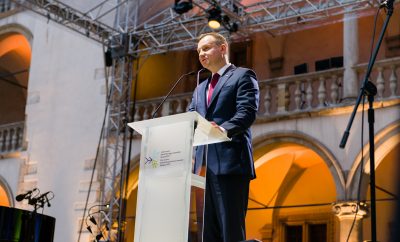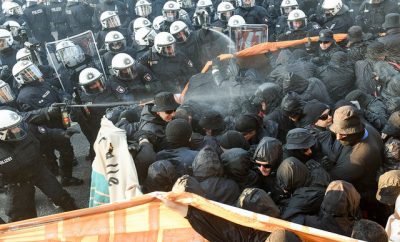 "Macron President, Emmanuel Macron campaign poster, Paris" courtesy of Lorie Shaull; License: (CC BY 2.0)
"Macron President, Emmanuel Macron campaign poster, Paris" courtesy of Lorie Shaull; License: (CC BY 2.0)
World
Emmanuel Macron Won the French Election, but Populism is Not Dead
The world watched with bated breath on Sunday to see if the tide of nationalism sweeping through Western democracies would rise even higher in France. By voting in Emmanuel Macron–a proponent of the European Union–the French people, for the time being, stemmed that rising tide. But Sunday’s election, in which Macron won over 66 percent of the vote, was not a death knell for populism.
Marine Le Pen, the face of France’s populist movement, was roundly defeated by Macron, but one-third of the country supported her populist nationalism and anti-EU posturing. Equally as important to the future of France, however, is the parliamentary elections set to take place between June 11 and 18, which will shape France’s government and determine the length of Macron’s leash as he pursues his agenda.
As France moves beyond this divisive election, it is unclear exactly where it is heading. For one, Le Pen’s National Front party resonated with some 10 million people, a great deal more than it did in 2002 when her father was crushed in the run-off by Republican Jacques Chirac. But the far-right National Front was not the only fringe player this time around. Far-left candidate Jean-Luc Mélenchon attracted hordes of young people and others who are equally as disaffected by the European project and its moneyed elites.
Populist yearnings, or at least curiosities, will not simply vanish because of Macron’s resounding victory. In 2017, for the first time in decades, France’s top two parties were not of the traditional left-wing, right-wing dichotomy. People in France–and, seemingly, around the globe–are craving change. If Macron is able to deliver tangible benefits to the people–from the factory worker in France’s hinterlands to the young, unemployed Parisian–then perhaps he can bring about a new stability that will defend against hard-liners like Le Pen and Mélenchon.
The first test of Macron’s effectiveness will come next month, during the two-round parliamentary elections, which follow the runoff format used in the presidential election. His En Marche! (Onward!) party, formed last year, will have to attract a sizable swath of parliamentary seats to carry out Macron’s centrist vision.
Conditions in France have clearly enabled populism to grow–on both ends of the political spectrum. Macron’s most important–and most challenging–task will be to appeal to those who voted him in (many who did so reluctantly, more against Le Pen than for Macron), and to create conditions and opportunities that snuff the growing populist flame. After Sunday’s vote, Macron appeared ready for the myriad challenges that face him and the republic he will now lead.
“I understand the divisions of our country that have led some to vote for extremists,” he said. “I understand the anger, the anxiety, the doubts that a great part among us have also expressed.” Later Sunday evening, Macron, standing in front of the Louvre, pledged to make good on his all-inclusive platform: “I will do everything I can in the coming five years to make sure you never have a reason to vote for extremism again,” he said.








Comments